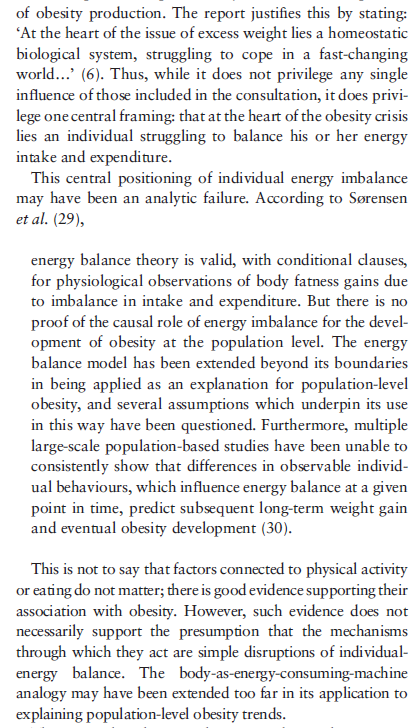The energy im/balance conundrum
Over the past few weeks I’ve been re-reading some of my own work and reflecting on a theme threading between three pieces: the energy balance conundrum.
The first of the three pieces is Stanley Ulijaszek and my review of obesity policy in the UK. We reviewed obesity policies themselves, as well as the cultural contexts in which they were developed. The peer review process for this paper was one of the more complicated I have been involved with. Complicated, because the reviewers took issue with all sorts of unexpected aspects of the paper (not least the title; the final, unwieldy version reflects our accommodation of the multiple voices involved in the review!).
One sentence nestled in the paper was particularly controversial. We said the idea that an “energy imbalance” underpins obesogenesis had never been proven. The reviewers insisted we remove the offending claim as it was contrary to all conventional wisdom. They pointed out that of course an imbalance of calories – too many calories consumed in food, not enough expended through physical activity – was at the heart of the matter. We agreed to remove the claim if the reviewers could share evidence that it had been proven. They couldn’t. We also looked more into it ourselves, and found other voices, like that of Thorkild Sørensen and colleagues, similarly querying the “energy balance” hypothesis and its application to population-level obesity (a bit of an aside: for more on the difference between sick individuals and sick populations, go no further than Geoffrey Rose’s classic paper). Our initial sentence querying of the placement of calories at the centre of theorising population-level obesity was only strengthened in the final publication (see below screenshot).
The second is a paper that arose out of a collaboration with Marisa Wilson. Our very thorough Research Assistant, Michal Shimonovich, noticed some unexpected figures in some of the data she had been compiling relating to Nauruan diet and obesity. It has always been assumed that transition to a high-calorie diet in the second half of the twentieth century underpinned population-level emergence of type 2 diabetes and obesity on the island. Yet we checked, and re-checked, scouring archival records and survey data, and found very little evidence that caloric intake had increased significantly on the island as claimed by many other sources.
The third is a piece I developed based on the work of Gyorgy Scrinis, out of a workshop run by Marvin Joseph Fonacier Montefrio and Richard Wilk about healthy and sustainable food in the Pacific. In it, I looked at how nutritional science, and the way it reduces food to a collection of chemicals and calories, has had profound effects on islander diets. According to Scrinis, the “focus on nutrients has come to dominate, to undermine, and to replace other ways of engaging with food and of contextualizing the relationship between food and the body.” This is certainly the case in Nauru, and its effects are still not entirely understood.
Reduction of food to calories, and obesity to a matter of energy imbalance, are cultural practices that serve us well in some ways and poorly in others. The history of science matters here. Calorimetry, the practice of measuring heat released from chemical reactions, traces to the 1780s and Antoine Lavoisier, whose contraption measured ice melted by respiring guinea pigs. Discussion of “the calorie” as a unit of energy has its roots in the industrial revolution, and appears in 1820s lectures about heat engines in Paris. The notion of “energy balance” in the human body traces to the notion of homeostasis, the maintenance of internal stability, which has its roots in 1840s physiological research in Paris. It is also linked to work on the first law of thermodynamics, in the 1850s. We see the theory of homeostasis reflected in Ross Ashby’s homeostat, one of the first machines capable of adapting to a changing environment. And so on, bodies and technologies shape each other, each giving us new metaphors through which to think about the other.
Energy imbalance hypothesis has never been proven, does not appear to underpin obesity emergence in all cases, and undermines other ways of engaging with food. Perhaps better understanding the complex cultural history of this trope will help us to understand whether it still makes sense to place it at the centre of theorising obesity.
Note: I don’t normally write about sources that people cannot easily access, and I can only apologise for article paywalls. If you’re ever struggling to access something I reference, please just email me and I’ll forward it onto you.
